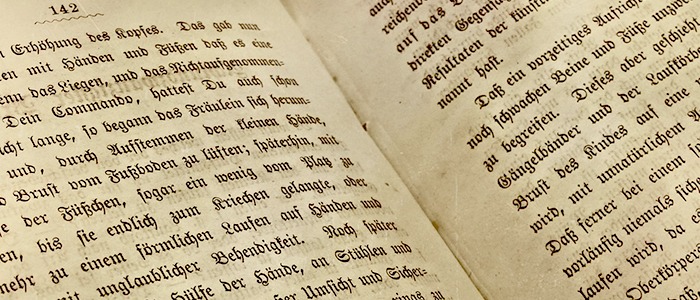The Ins and Outs of German Pronunciation
It’s pretty common knowledge that German has a very regular writing system. Unlike some languages (say… English….) the German-speaking world has agreed on a series of spelling reforms that have helped make the language simpler and more consistent to read and write.

But on the other hand, it’s a widely-held belief that German pronunciation is difficult, or that it’s full of “harsh” sounds. Many people study the language for years yet still have problems with their accent.
In this article, I’ll show you how to develop natural-sounding German pronunciation. I’ll also go into a little detail on the things that don’t get mentioned by most pronunciation guides, so you can correct any mistakes you might be inadvertently making.
Ready? Let’s begin.
German Pronunciation: The Consonants
If you’re a native English speaker, congratulations! You already know how to make virtually all the German consonants. English and German both belong to the West Germanic family of languages, so it’s no surprise that a lot of their sounds are the same. In fact it’s a bit of a waste of space to remark on all the sounds that the two languages share. So what are the differences?

Ich-Laut and Auch-Laut
One consonant that gives German learners lots of trouble actually has two forms, even though they’re both represented by the letters ch. They’re known as the “ich-laut” and the “ach-laut” because, well, one form appears in “ich”, and the other in “ach”.
Take a moment to notice where your tongue is when you say the first sound of “ich” (short “i” as in i-gloo) and the first sound of “ach” (short “a” as in f-a-ther). These two vowels are actually pronounced on different ends of the mouth.
This is the key to the difference between the sounds. The “ich-laut” is made up front next to “i”, and the “ach-laut” is way back next to “a”. It’s just more convenient that way! So once your tongue is in place for the vowel, try breathing out without changing its position. With a little practice, you’ll be able to make a nice clear “ich-” or “ach-laut” that you can be proud of.

Many dialects of English have a sound that gets really close to the “ich-laut” – the “h” at the beginning of the word “huge” is also made at the front of the mouth. It’s important that you don’t say “sh” as in “shoe” for this sound, because those two sounds are perceived quite differently by a German native.
The Letter R
Everyone knows the letter “r” is no picnic for the student of German. To make matters worse, this letter also represents two sounds–called the consonantal and the vocalic “r”.
The rules for when each one gets used are a little bit too complex for the scope of this article, but when you listen to a native speaker the difference between the two sounds is immediately clear.
To make the consonantal “r”, you’ll first need to remind yourself of the “ach-laut”. Speakers all over Germany, Austria, and Switzerland have slightly different variations of the consonantal “r”, but they’re all produced very close in position to the “ach-laut”–and they’re voiced.
Essentially, start by making the “r” sound found in English, and slowly move the sound to the back of your throat around where the “ach-laut” comes from. Your tongue should go downwards and backwards, and your mouth might open a little bit–and there it is!
The vocalic “r” is a lot easier in comparison, certainly easier to describe in text! It’s a very similar sound to the unstressed “schwa” sound represented in English by the “a” in “dogma.” It’s made with your tongue just a bit lower and maybe a little bit more tense. This version of “r” often follows the German vowel “e”, for example in the word “mehr.” That word has four letters but only one consonant (the “m”) and two vowels (“e” and “r”). What is the “h” doing? Read on…

German Pronunciation: Vowels
German vowels may not have the same reputation that the consonants do, but they’re still an important part of the language you definitely can’t ignore.

Ö and Ü
“Ö” and “ü” are what we call front rounded vowels. That means they’re produced in the front of the mouth and also with the lips rounded. English only has back rounded vowels. But it has exactly the same front vowels, we just need to round our lips.
Let’s give it a shot. Say “iiii” as in “ea-st”, and as you draw out that sound just pucker your lips. The sound changes to a perfect “ü”! It takes a good deal of practice to be able to make that sound quickly in the middle of words, but once you can make it by yourself you’re doing better than most. Remember, it’s one clear sound, not a “yu” like in “future”.
Now, the “ö” in its unrounded form is just like the “schwa” from earlier. Draw out that sound and pucker up those lips. A five-star “ö”! Once you can make both of these sounds at will, try putting them next to different vowels or consonants. Learning accurate pronunciation is all about practice–reading a dozen articles like this one is no match for five minutes of trying it out.
One more important thing that nobody told me for years was that the letter “h” following a vowel makes it longer. So the word ‘Bahn’ has a distinctly long vowel. Plenty of languages have long and short vowels, so this isn’t particularly tricky for most German learners, but it’s something that can really help you with a good accent.
***
How else can you achieve a perfect German accent? Being aware of the sounds is one thing, but putting them into action in words and sentences is something else. It’s absolutely critical that you get tons of exposure to native German audio, whether it’s designed for learners or for native speakers. And once you have a great mental model of what the language ought to sound like, you can record yourself. First you’ll cringe at your own mistakes, then you’ll learn from them, then you’ll eliminate them. Check out LingQ today to discover how to learn German fast using content you love! For more tips on how to improve your German, check out this video from LingQ cofounder and polyglot Steve Kaufmann.
Alex has studied German by himself and in the classroom. He is fascinated by all languages, and currently uses German, Mandarin, and Indonesian daily.

